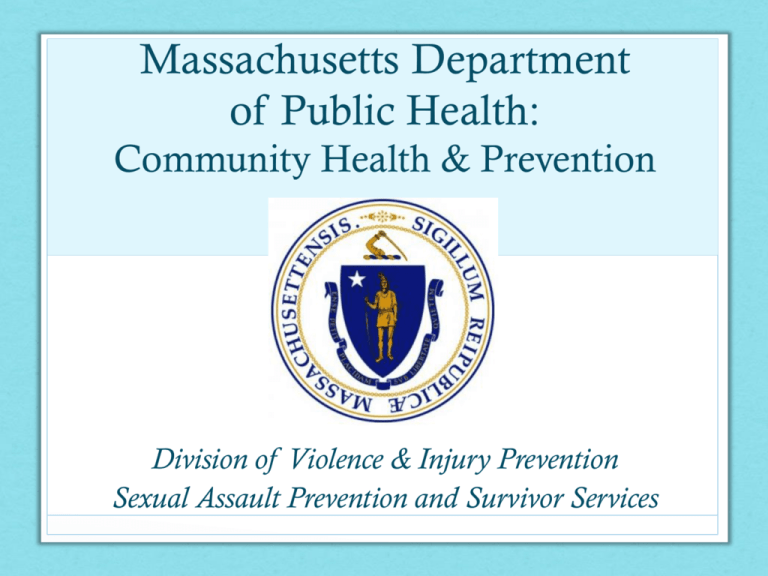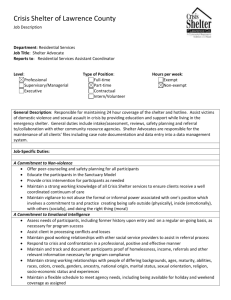
Massachusetts Department
of Public Health:
Community Health & Prevention
Division of Violence & Injury Prevention
Sexual Assault Prevention and Survivor Services
This poster presentation was supported by funding from the Centers for Disease
Control and Prevention (CDC). Its contents are solely the responsibility of the
authors and do not necessarily represent the official views of the CDC or the
Massachusetts Department of Public Health.
Practicum Setting
The mission of Sexual Assault Prevention and Survivor Services (SAPSS) is to
change social norms that foster sexual violence, to encourage a climate where
sexual assault is not tolerated, and to promote and enhance effective and
accessible services for all survivors of sexual assault. To accomplish this
mission, SAPSS:
•
Advocates for sexual assault prevention and survivor needs statewide in
the development of policies and programs, and provides information and
technical assistance to other agencies, community organizations, and the
public at large;
•
Collects and analyzes data on sexual assault and evaluates sexual assault
survivor services and community education programs; and,
•
Fosters collaborations with other state and community organizations, such
as Jane Doe, Inc.: The MA Coalition Against Sexual Assault and
Domestic Violence, to maximize the effective use of resources and achieve
program goals toward the elimination of sexual assault.
http://www.mass.gov/eohhs/gov/departments/dph/programs/community-health/dvip/violence/sapss/
Objectives
As a member of the Sexual Assault Prevention and Survivor Services
(SAPSS) team at the Massachusetts Department of Public Health, I
worked on a variety of projects from August 2012 through May 2013.
Projects were assigned to correspond with the following objectives:
•
Support a statewide mission to use evidence based prevention
programs and to develop the capacity of Rape Crisis Centers;
•
Collaborate with experts to provide the most current thinking in
the field to service providers;
•
Assist the Governor’s Council on Sexual and Domestic Violence;
and,
•
Develop and analyze surveys to inform the SAPSS statewide
mission as per CDC requirements.
Key Projects
•
Governor’s Council to Prevent Domestic and Sexual Violence:
• Higher Education Committee
• Disabilities Committee
•
Jane Doe Inc. and MADPH sponsored working groups:
• E-learning opportunities for Rape Crisis Centers
• Medical Advocacy and the role of gender
•
Data cleaning for department Epidemiologist:
• Rape Crisis Incident Report Forms, Sexual Assault Prevention
Outreach and Education Activity Report Forms (ARF), RCC Monthly
Service Delivery Form (MSDR)
•
Implementation of CDC surveys to assess local organization
evaluation capacity and MADPH survey to assess technical
assistance activities
Results
•
A summary report and presentation of results from all CDC and MADPH
surveys (to be finalized on 4/23 and will present on 5/7 at state provider meeting)
•
Draft letter from the Lt. Governor to all college/university President's
regarding the implementation of Title IX (send date is still TBA)
•
Updated version of the 'Healthy Relationships, Healthy Sexuality and
Disability Guide' co-sponsored by MADPH and the Department of
Developmental Services (in production)
•
A summary of the inclusion of men in medical advocacy (complete)
•
Inventory of sanctioned e-learning resources for pre-service crisis
counselor training (complete)
•
Supported data collection process and produced review report to
department epidemiologist (complete)
Governor’s Council to Prevent
Domestic and Sexual Violence
Higher Education Committee
Council Members
•
Boston Area Rape Crisis Center*
•
Boston University
•
UMass Amherst, Center for
Women and Community*
•
Tufts University
•
Assumption College
•
Lasell College
•
Mt. Ida College
•
Bridgewater State University
•
Stonehill College
•
Merrimack College
•
Futures Without Violence
•
Health Imperatives
•
Victim’s Rights Law Center
•
Department of Higher Education
•
Massachusetts Department of
Public Health
•
Jane Doe, Inc.
* Members serve as committee
chairs
Population & Background
• There are more than 630,000 undergraduate and graduate
students in Massachusetts at 133 public and private colleges
and universities.
• The Department of Justice reports that 1 in 5 women are
sexually assaulted while in college.1
• In April 2011, the Department of Education, Office of Civil
Rights issued a Dear Colleague Letter directed at the
administrations of every college and university in the US;
• The letter was intended to prompt colleges and universities to review and
revise policies and procedures addressing sexual misconduct, stalking and
intimate partner violence, particularly as those forms of gender-based
violence constitute gender discrimination under Title IX.
1. Krebs, Christopher P., Et Al., The Campus Sexual Assault Study: Final Report xiii (Nat’l Criminal Justice Reference Serv., Oct. 2007), available at
http://www.ncjrs.gov/pdffiles1/nij/grants/221153.pdf.
Objectives
• Work with committee members to identify goals of the committee.
• Assist with drafting and finalizing letter to presidents of all
college/universities in Massachusetts to reinforce the messages in
the Dear Colleague Letter.
• Develop letter distribution plan to institutions and supporting
organizations.
• Create a campus resource guide with locate domestic and sexual
violence agencies to include with the letter.
• Shepherd letter through review process and assist in the
distribution:
• Mailing process for hard copies of the package to all university
administrators.
• Email process for e-version of package to all supporting agencies.
Results
• Draft version of the letter was submitted to the
Lieutenant Governor’s office in late February.
• Intention was to mail letters to university presidents and
administrators in April to coincide with Sexual Assault
Awareness month.
• Letter has been approved by the Department of Higher
Education, still waiting for approval by the Lieutenant
Governor’s office.
• Survey finalized and entered in Survey Monkey. The
survey link will be distributed with the letter along with
completed resource guide.
Next Steps &
Recommendations
• Pending the distribution of the letter the following
activities will be planned:
• Trainings and workshops for college administrators to focus
on topics related to domestic and sexual violence prevention.
• Using the survey results, highlight best practices and
promising initiatives at selected colleges/universities.
• Recommendations:
• Utilize the survey results to create a state of the
commonwealth report summarizing prevention
programming on college campuses and best practices related
to policies.
CDC Rape Prevention
Education (RPE) Program
Results from the CDC RPE Program Local Evaluation
Capacity Survey, Local Prevention Program Inventory
Survey, and Technical Assistance Survey
CDC RPE Program
Background
RPE current activities include:
RPE program prevention principles include:
• Implementing primary prevention
• Preventing first-time perpetration and
strategies such as engaging bystanders,
victimization;
educating youth about healthy
• Reducing modifiable risk factors while
relationships, and changing social norms;
enhancing protective factors associated with
sexual violence perpetration and victimization; • Operating statewide and community
hotlines;
Using the best available evidence when
planning, implementing, and evaluating
prevention programs;
•
•
Building state and local capacity for
program planning, implementation, and
evaluation;
Incorporating behavior and social change
• Implementing their state sexual violence
theories into prevention programs;
primary prevention plan; and
Using population-based surveillance to inform
Assessing state system and local
program decisions and monitor trends; and
Evaluating prevention efforts and using the
results to improve future program plans.
organization evaluation capacity.
http://www.cdc.gov/violenceprevention/rpe/
Objectives
• Implement CDC surveys using Survey Monkey to
ensure 100% response rate from 17 Rape Crisis
Centers receiving RPE funding.
• Develop survey to evaluate technical assistance
services provided by the state coalition (funded by
MADPH).
• Collect and analyze survey responses. Report key
findings to SAPSS department and present findings
at state provider meeting on May 7th.
Key Survey Findings
Recommendations








